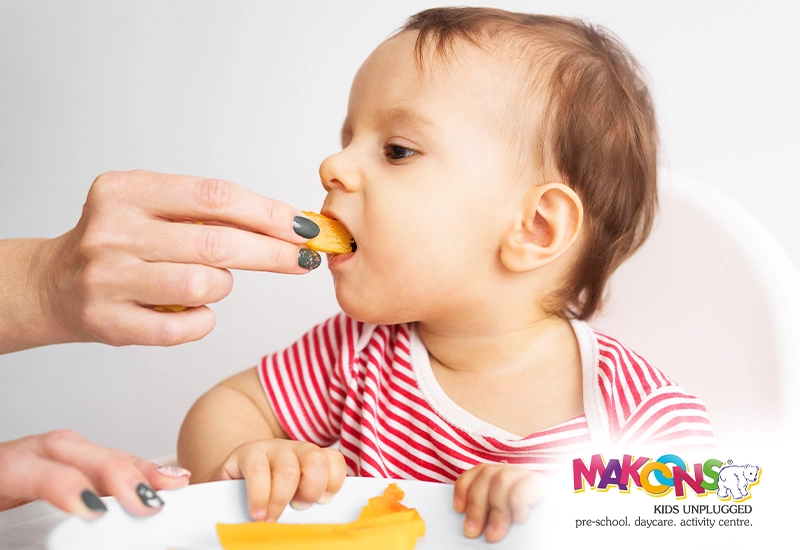When you have a baby, you are always concerned about their health. You can think of questions like what to feed the kids, how to feed them, what should be the routine, and other questions. When you encourage your kids to try new food items, taste, texture, and flavors, you help them open their options for better food categories in life. Studies around this concept show that kids who have a broader experience with food lead a healthier life.
Many parents who have babies that are between 4 to 7 months in age try to feed some kinds of solids to the baby. However, the baby food guide first year suggest that the baby is about 6 months old, so parents should understand the baby’s readiness and their nutritional needs.
Your doctor should be consulted before adding or reducing any kinds of food items from the diet.
Baby’s Readiness To Eat Solids
If your infant is ready for solid foods, how can you tell?
A few tips are as follows that will help you understand it and opt for safe foods for babies:
- Does your infant push food out of their mouth or swallow it? The tongue reflex in babies causes them to push food back out. Hold off until this reflex goes away, which usually happens when kids are between four and six months old.
- Is your infant able to hold their own head up? An infant must be able to sit up and have strong head and neck control in order to consume solid food.
- Does your infant want to eat? Babies are prepared to attempt solid foods when they open their mouths, look, and reach and grab for food.
- Wait a few days before attempting again if your baby appears irritated or uninterested in solid foods after your doctor gives the all-clear.
Changing Nutrition Needs
During the first year of life, your baby’s nutritional demands will fluctuate. Hence, you need safe foods for babies. Most newborns are ready to start solid meals at six months of age, in addition to breastmilk or infant formula. Your baby will start to drink less breast milk or infant formula as they start eating more solid food, but these foods are still vital to them.
Let’s discuss the best food for babies 6-12 months.
Breastfeeding
Your infant will typically breastfeed five to six times a day (24 hours) after six months. While you begin solid foods, keep breastfeeding. Both you and your child will gain more from breastfeeding for a longer period of time. There is no need to give your infant any other milk if you are nursing. Find out more about nursing your child.
Baby Food In The Form Of Infant Milk
The newborn baby nutrition tips have some changes when the child becomes older than 6 months. Your infant will breastfeed four to five times a day (24 hours) between the ages of six and eight months, consuming 120 to 240 milliliters (4 to 8 ounces) every feeding. Find out more about giving your child formula.
Your baby will nurse less frequently between the ages of 9 and 12 months, but they may drink more at once. At this age, you can also substitute pasteurized, homogenized whole milk (3.25% milk fat) for formula or breastfeeding. Find out more about giving your infant calcium-rich protein foods by consulting your doctor.
Foods To Avoid Feeding The Baby In The First Year
The baby food guide first year should revolve around the discussion of food items that you should avoid. These consist of wheat, soy, peanuts, eggs, shellfish, cow’s milk, and nuts. Food allergies cannot be avoided by delaying the introduction of these foods.
Peanut allergies are more common in infants with severe dermatitis or egg allergies.
The following are potential indicators of an allergic response or food allergy:
- Increased gassiness or rash bloating
- vomiting and diarrhea
Infants should not be fed the following:
- foods heavy in salt, sweeteners without calories, and added sugars, until after the first birthday. Babies may get botulism from it.
- unpasteurized cheese, yogurt, milk, or juice
- Before a year, use soy drinks or ordinary cow’s milk rather than formula or breast milk. Pasteurized cheese and yogurt are acceptable.
- Choking-hazardous foods include popcorn, almonds, raw carrots, nuts, and grapes.
The newborn baby nutrition tips are incomplete until parents have the idea about food items to avoid. It is important as nothing comes before health and these food items can put the baby’s health at risk.
Here are some tips that parents should take to ensure the safe foods for babies.
- Cook your baby’s meals in methods that retain the most vitamins and minerals to protect its nutrients. Instead of boiling fruits and vegetables, which removes the nutrients, try steaming or baking them.
- Any pieces that you won’t use right away should be frozen as it ensures newborn baby nutrition tips.
- Texture and consistency are crucial whether you buy the baby food or prepare it yourself. Babies should initially be fed single-ingredient foods that have been finely puréed.
Also Read- Baby Skincare Tips – A Guide for Newborn Baby’s Parents
Conclusion
The baby food guide first year should be followed by parents as they help parents decide a healthy eating routine for the child. The food guide helps in meeting the nutritional needs and also, aids the baby’s growth. However, you should not try all food items for the baby as it gets them difficult to digest. So, be smart and ensure the best things for your baby.


